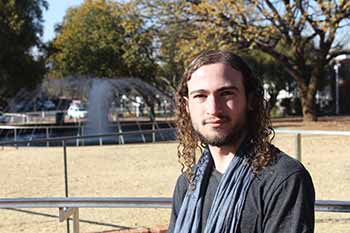Latest News Archive
Please select Category, Year, and then Month to display items
07 January 2018
Photo Charl Devenish
 Dr Anneke van der Spoel van Dijk is invested in contributing
to the global effort of stopping TB by 2035.
Dr Anneke van der Spoel van Dijk is invested in contributing
to the global effort of stopping TB by 2035.
The work of Dr Anneke van der Spoel van Dijk investigates the spread of TB in the Free State population using techniques such as next generation sequencing, spoligotyping and MIRU-VNTR typing. Dr Van der Spoel van Dijk, a senior medical scientist in the Department of Medical Microbiology at the University of the Free State (UFS) also looks at drug resistance in her research. This work informs decisions about how best to treat patients with multidrug-resistant TB (MDR-TB).
She employs rapid molecular techniques to track one of Africa’s most serious diseases, tuberculosis (TB).
Drug resistance
Scientists assist the National Health Laboratory Service and Department of Health in trying to refine the diagnostic tools to identify these cases earlier. Dr Van der Spoel van Dijk explains: “Until recently, it took up to two years to fine-tune treatment decisions for patients with MDR-TB. Patients get a cocktail of anti-TB drugs, but it takes time to find the right combination. Re-infection and relapse (patients stopping treatment for several reasons) add to the diagnostic and treatment management challenges.
Enormous impact
“Now doctors can reduce the time needed for diagnostic certainty to about seven days, while new drugs allow reduction of treatment from more than 18 to nine months. This can have an enormous impact on the life of many patients.”
Dr Van der Spoel van Dijk’s work forms part of research in the faculty looking at resistance development in TB strains. She is currently also doing her doctoral thesis on the differences and incidence of MDR-TB among adolescents versus adults. Dr Van der Spoel van Dijk says: “It is a complicated picture, but we hope to unravel it to support better diagnostic tools and patient care.”
As part of the National Health Laboratory Service, her department is playing an important role in TB diagnostics and the training of scientists and future pathologists. “Our work is contributing to the global vision to stop TB by 2035,” Dr Van der Spoel van Dijk says.
Young language Einstein set for Europe
2017-07-10

Willem Carel Brink will be studying in France and Italy
for the next two years as part of his master’s
degree programme
Photo: Rulanzen Martin
German, French, English and even Latin are just a few of the languages known by Kovsies’ own language guru, Willem Carel Brink.
This arty junior lecturer and 2015 Senate and Dean’s medal recipient at the Department of Afrikaans and Dutch, German and French at the University of the Free State (UFS) received the Erasmus-Mundus bursary to conduct his master’s degree under the Erasmus Mundus Master en Cultures Littératures Européennes (CLE) title. He departs for Europe in September. “It is a structured interdisciplinary study which focuses on European literature, culture and other aspects,” Willem says. The subject for his thesis will be determined during the duration of the course.
Two-year course under Erasmus Mundus
The Erasmus CLE master’s is a two-year course which is presented by five partner universities in France, Senegal, Italy and Greece. Students are expected to indicate at which universities they want to study but cannot spend both years at the same university. “France was my first choice, because I know the language – which was a prerequisite for selection,” said Willem. He is fluent in Afrikaans, English, German and French!
“I will spend my second year in Bologna, Italy,” he said. It is therefore also expected that he does an Italian course during the first year to prepare him for the second year in Italy.
Future collaboration with UFS a prospect
Future collaborations between him and the language departments at the UFS are possible prospects for the future when he returns. “What makes this degree especially attractive to me is that it has value in terms of the local environment in the teaching of European languages and literature.”